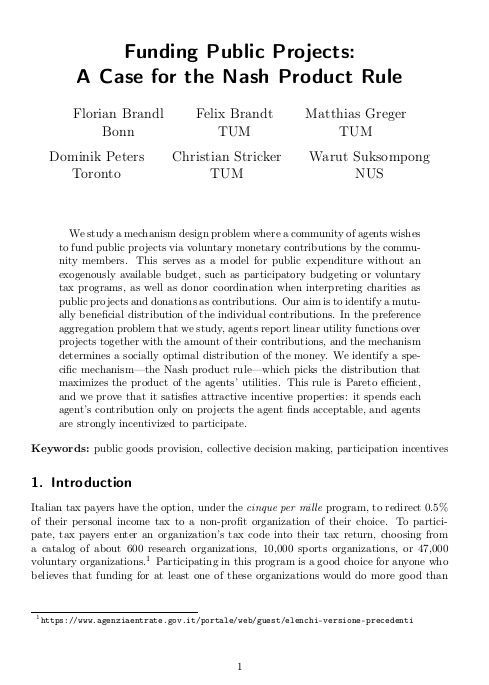Funding public projects: A Case for the Nash product rule
Florian Brandl (University of Bonn), Felix Brandt (Technische Universität München), Matthias Greger (Technische Universität München), Dominik Peters (University of Toronto), Christian Stricker (Technische Universität München) and Warut Suksompong (National University of Singapore)
GPI Working Paper No. 14-2021, published in Journal of Mathematical Economics
We study a mechanism design problem where a community of agents wishes to fund public projects via voluntary monetary contributions by the community members. This serves as a model for public expenditure without an exogenously available budget, such as participatory budgeting or voluntary tax programs, as well as donor coordination when interpreting charities as public projects and donations as contributions. Our aim is to identify a mutually beneficial distribution of the individual contributions. In the preference aggregation problem that we study, agents report linear utility functions over projects together with the amount of their contributions, and the mechanism determines a socially optimal distribution of the money. We identify a specific mechanism—the Nash product rule—which picks the distribution that maximizes the product of the agents’ utilities. This rule is Pareto efficient, and we prove that it satisfies attractive incentive properties: it spends each agent’s contribution only on projects the agent finds acceptable, and agents are strongly incentivized to participate.
Other working papers
Welfare and felt duration – Andreas Mogensen (Global Priorities Institute, University of Oxford)
How should we understand the duration of a pleasant or unpleasant sensation, insofar as its duration modulates how good or bad the experience is overall? Given that we seem able to distinguish between subjective and objective duration and that how well or badly someone’s life goes is naturally thought of as something to be assessed from her own perspective, it seems intuitive that it is subjective duration that modulates how good or bad an experience is from the perspective of an individual’s welfare. …
Is Existential Risk Mitigation Uniquely Cost-Effective? Not in Standard Population Models – Gustav Alexandrie (Global Priorities Institute, University of Oxford) and Maya Eden (Brandeis University)
What socially beneficial causes should philanthropists prioritize if they give equal ethical weight to the welfare of current and future generations? Many have argued that, because human extinction would result in a permanent loss of all future generations, extinction risk mitigation should be the top priority given this impartial stance. Using standard models of population dynamics, we challenge this conclusion. We first introduce a theoretical framework for quantifying undiscounted cost-effectiveness over…
Population ethical intuitions – Lucius Caviola (Harvard University) et al.
Is humanity’s existence worthwhile? If so, where should the human species be headed in the future? In part, the answers to these questions require us to morally evaluate the (potential) human population in terms of its size and aggregate welfare. This assessment lies at the heart of population ethics. Our investigation across nine experiments (N = 5776) aimed to answer three questions about how people aggregate welfare across individuals: (1) Do they weigh happiness and suffering symmetrically…

